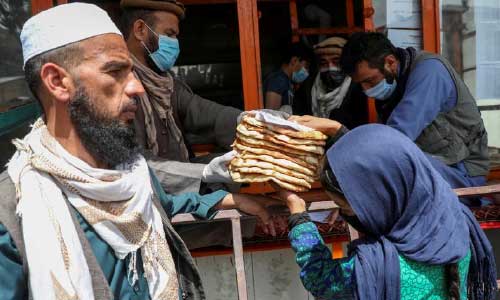KABUL - Afghanistan is likely to receive reduced pledges for aid from international donors gathering in Geneva next month, three sources familiar with discussions said, amid uncertainty over how the government’s peace talks with the Taliban will progress.
Washington is hoping the intra-Afghan peace process will eventually bring the curtain down on the United States’ longest war, as it plans to withdraw the remaining few thousand personnel still in Afghanistan by May.
But the withdrawal of foreign forces will leave behind a country still dependent on foreign aid, and one in which the Taliban could secure greater influence, making donors uneasy over whether the hardline Islamists will try to roll back progress made on human rights and girls education.
The Taliban did not respond to requests for comment on the concerns, and it was not known whether their representatives would be invited to the donors conference in Geneva on Nov. 23/24.
But some analysts see foreign aid as vital in helping donors shape policies of any future Afghan government.
“It’s one of the primary forms of leverage the U.S. and international community believe they have over the Taliban,” said Andrew Watkins, an analyst covering Afghanistan for International Crisis Group. “Any future Afghan state will rely on foreign aid almost as much as the current one does.”
The impact of the coronavirus epidemic this year has made Afghanistan’s plight worse, with government revenues sinking, and unemployment and poverty projected to rise dramatically.
Yet, donors are likely to tell Afghanistan to expect, possibly significantly, less aid, while also imposing stricter conditions and committing funds for a shorter period, said the three sources, who declined to be named because the discussions are private.
All three sources said the United States, Afghanistan’s largest donor, is likely to make deep cuts to its current annual contribution of around $800 million for civilian funding, beyond the money allocated for defence and security needs.
One said Washington could not only “cut aid by half”, but could also move “away from a four-year-commitment cycle” to pledge funds for just a year.
Other NATO members like Britain and France were also considering reducing pledges, while Australia was planning cuts of up to 30%, two sources said.
The U.S. State Department and Australia’s department of foreign affairs did not immediately respond to requests for comment. France’s Embassy in Kabul declined to comment and the British Foreign Office did not respond to questions around its plans on aid pledges.
SWITCHING TO ANNUAL REVIEWS
Dozens of donor nations and multilateral institutions have met every four years to pledge the billions of dollars that fund roughly three-quarters of the Afghan government’s budget.
The aid is largely pledged to the Afghanistan Reconstruction Trust Fund (ARTF), a World Bank managed fund that finances vital national priority programs in a country where the United States has been fighting for 19 years. (Reuters)
Home » Afghanistan » International Donors Likely to Pledge Less Aid for Afghanistan
International Donors Likely to Pledge Less Aid for Afghanistan

